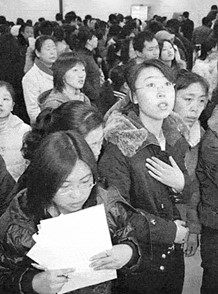By Dongyu Zhang
A joke circulating among young Chinese female netizens is “Being born a woman is already hard enough, but if you are unlucky enough to be born in Asia, it will be a true nightmare”.
In China, it is difficult for girls to overcome the preference for boys, grow up safely, finish school, and get hired before entering the workforce. This dilemma in recruitment processes is different from what most people perceive because it is not a test of education or work experience. Like the overt violence of misogyny of some men, it is a kind of misogyny that is embedded in the logic of the workplace with almost all jobs, in addition to babysitting for the family and children. “Women often face harsher choices than men in the job search process, more than 80% of women believe they faced employment dilemma and discriminatory”, said Chunrong Lv (2017), a China News reporter. It means that as long as you are a woman, you are going to have a hard time finding a job; whereas if you are a man, you have already won half the battle, regardless of the conditions.

This dilemma is hard to understand in a nutshell. In fact, in my short work experience, I once worked in a cultural industry company in China from 2021 to 2022 and served as a personnel recruiter there. This work experience has made me have a deeper experience of the dilemma of Chinese women seeking jobs.
The company I work for is in the design and copywriting industry and only requires the appropriate knowledge to be competent, yet gender is an important consideration in the recruitment process.
First of all, in the recruitment process, faced with resumes that met professional requirements, we were asked to give preference to males at the same level for further discussion, including age, education, work experience and even resume photos. This is true even with the same level of job seekers. A clearer example is the video recording I once saw in January 2023 of a couple of overseas students in London, returning to China to apply for jobs. They were the same age, graduated from the same university (or even high school), had the same degree and the same major, and even were born in the same place, the number of offers for girl was much lower than for boy.
Secondly, in the interview process, women will also be asked a lot of questions that have nothing to do with their work ability. I remembered clearly that in our interview process, I had to clearly record whether the female applicants are single, married, have children, are ready to have children and so on. These questions would largely determine whether the company leader would choose the female, while for the man, there were few relevant topics, just details of work experience.
Although Chinese law does not allow gender discrimination in recruitment, most companies still implicitly include gender in the recruitment assessment. The apparent reason is that because women leave the workforce for short periods due to pregnancy and childbirth, it is always difficult to complete engagement in a certain whole work project, reducing the efficiency and revenue of the company. But the reason behind this is still the hegemony in China, which is the male welfare society created by hegemonic masculinity. What men represent is right and good, and the underlying logic that women are subordinate to men and inferior to men is hard to change. This contrast between the sexes in the lives of Chinese women. I think the point of this contrast is not that women are more suitable for families, but that women are less suitable for work than men.
In European solutions and regulations for implicit gender discrimination in the recruitment process, I think there are many options to help Chinese women. The European Union proposed Gender Equality Plan has clearly defined guidelines for companies in recruitment and has introduced handbooks that details the aspects in which companies should assess their recruits and ensures transparency in the recruitment process; meanwhile, the use of science technology and dissertation research to identify and address unconscious gender bias is a practical way to change masculinity. Only with a clear and unambiguous explanation of what constitutes unreasonable bias and irregularities in recruitment can women be freed from gender oppressions.
Conclusively, Chinese women still suffer from gender bias in the recruitment process due to patriarchal society and masculinity, but with the feminist movement and awakening, more Chinese women are exposing the discrimination they suffer and are shaking up and breaking the patriarchal ideology to achieve gender equity in recruitment. I believe in the power of women will break this dilemma.
References
http://news.cctv.com/2017/03/07/ARTIhjsNBGpGNES96fjp7h8b170307.shtml
